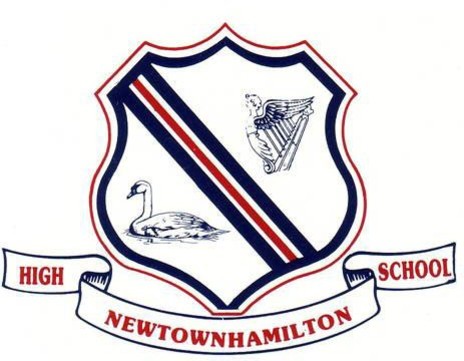Mathematics
Mathematics at Newtownhamilton High School
‘’There are things which seem incredible to most men who have not studied Mathematics’’
Aristotle, Greek Philosopher
Mathematics is a subject that opens doors and provides opportunities: doors to employment and further/higher educational courses and opportunities to learn about the relevance of Mathematics to every day life.
Mathematics is all around us. It exists in the proportions of artistic works, in the scores of our favourite songs and in the physical structures we live and work in daily. It is also the bedrock of many other subjects including the Sciences, Economics and Engineering and is extremely relevant to subjects like Psychology and Design.
The study of Mathematics can develop a host of skills that are essential to students continuing in their studies as well as those currently in or entering the workplace. These include problem-solving, logic and reasoning, and attention to detail. Mathematics can also lead to careers in finance, business, IT and teaching, among others.
At Newtownhamilton High School, we have very high expectations for all of our pupils and always aim to create an environment where students can develop their full potential. We encourage and promote problem solving skills and techniques at all levels and across the range of Mathematical topics, as well as encouraging students to recognise Mathematical experiences in other curricular areas. Students are also shown the relevance and importance of Mathematics to the real world and the impact it has.
Key Stage 3
In Key Stage 3 we follow the Northern Ireland Curriculum. We cover Shape & Space, Measures, Number, Algebra, and Data Handling over the three years. Incorporated into the scheme are Financial Capabilities, Mental Maths, Using ICT, Communication, Number Games and tasks in Using Mathematics. At the end of Year 10 pupils are assessed and assigned a level in Using Mathematics.
Key Stage 4
In Year 11 all pupils study CCEA GCSE Mathematics (foundation or higher) or Essential Skills Application of Number, dependent on their individual abilities and interests. GCSE Further Mathematics is also available as an option at GCSE. In Year 12 pupils have the opportunity to study Essential Skills Application of Numbers Level 2 depending on their ability.
Pupils at Newtownhamilton High School continually produce excellent results in GCSE Mathematics. In June 2017, 2018 and 2019 our three most recent exams, at least 77% of our pupils passed GCSE Mathematics with grades A* to C, this is a figure well above the corresponding figure for Non Grammar schools in Northern Ireland which is 56%.
In both June 2018 amd 2019 one pupil achieved maximum uniform marks in GCSE Mathematics, an outstanding performance.
GCSE Mathematics
The CCEA GCSE Mathematics (foundation or higher) specification gives students opportunities to:
develop their knowledge, skills and understanding of Mathematical methods and concepts
acquire and use problem-solving strategies
select and apply Mathematical techniques and methods in Mathematical, everyday and real-world situations
reason Mathematically, make deductions and inferences, and draw conclusions
interpret and communicate Mathematical information in a variety of forms.
It also gives students a sound basis for progression, including progression to further study of Mathematics at AS/A2 level or to the world of work.
Course Breakdown
In Year 11 pupils will study and sit Module M2 or M3 worth 45% of their final GCSE mark. In Year 12 pupils will study and sit module M6 or M8 worth 55% of their final GCSE mark. Some pupils will be given the opportunity to study Module M4 which will enable them to achieve the grade A*.
It is possible for pupils to re-sit any module once to try to improve their grade.
Essential Skills Application of Number
Essential skills qualifications in Application of Number are available at Level 1 and Level 2. The specifications for both levels specify the skill standards, coverage and range required. At each level of the qualification, these subsume the previous level’s skill standards and the indicative coverage and range, supporting a progression based suite of skills qualifications.
The assessments:
provide realistic contexts, scenarios and problems;
specify tasks that are relevant to the context;
equire application of knowledge, skills and understanding for a purpose;
require problem solving; and
assess process skills and the outcome of their application in different contexts.
Learners must pass one examination at the level for which they have been entered in order to qualify for certification at that level. Learners who do not achieve a pass in a level may re-enter at that level in a future series.
GCSE Further Mathematics
This GCSE Further Mathematics specification replaces Additional Mathematics specification and retains much of the same content.
Further Mathematics involves studying Mathematics at a level beyond GCSE Higher Tier. It can act as a stepping stone that gives students a sound basis for studying GCE Mathematics, introducing some of the mechanics and statistics topics that appear at AS/A2 level.
Further Mathematics can also help students progress to other studies that require mathematical knowledge and skills, for example higher level science, geography, technology or business.
The Further Mathematics specification consists of four units, and students must study three.
Unit 1:
Pure Mathematics students investigate algebra, trigonometry, differentiation, integration, logarithms, matrices and vectors.
Unit 2:
Mechanics includes exploring kinematics, vectors, forces, Newton’s Laws of Motion, friction, moments.
Unit 3:
Statistics includes understanding and using statistical terminology, measures of central tendency and measures of dispersion, probability, and bivariate analysis
Through these units students will have opportunities to:
develop their Mathematical knowledge, skills and understanding;
select and apply Mathematical techniques and methods in mathematical, everyday and real-world situations;
reason mathematically, interpret and communicate Mathematical information, make deductions and inferences, and draw conclusions; and
design and develop Mathematical models that allow them to use problem solving strategies and apply a broader range of Mathematics to a variety of situations.
Pupils studying GCSE Further Mathematics have produced excellent results in Newtownhamilton High School. In June 2018 100% of pupils studying GCSE Further Mathematics achieved a grade A* - B.
Career Possibilities
|
Accountant |
Engineer |
Statistician |
|
Actuarian |
Insurance Broker |
Surveyor |
|
Bank Clerk |
Operational Research |
Teacher |
|
Computer Programmer |
Shop Keeper |
Trading |
|
Economist |
Software Development |
|



